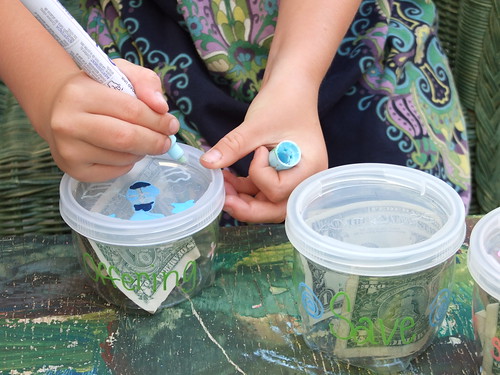We're like a lot of parents out there. We start an allowance/chore program and then fizzle out. We've been more disciplined about the chores ("this is your responsibility as part of the family...blah blah blah") then we have about actually paying out allowance. I admit it. We haven't always had the exact amount owed and before I know it, I've forgotten. Plus what do little people need money for anyway?
Well, Cousin Lauren visited for a good while last summer. She is the exact type of young lady you want your kids to be around for a good while. She's bright, responsible, considerate, and conscientious with a great personality.
Well, Cousin Lauren visited for a good while last summer. She is the exact type of young lady you want your kids to be around for a good while. She's bright, responsible, considerate, and conscientious with a great personality.
I am no fool. I took advantage of the gift before me and interviewed her as often as I thought of something. Exactly what did her parents do in this situation, or that situation? Not everything can be directly translated. Family dynamics are different and having three kids in the house is different than two but the underlying principles and the fundamentals for what you want for your kids doesn't differ between 1 kid or 25.
This brings me back to the allowance/chore discussion. Cousin Lauren is quite financially responsible for a young lady her age (14). She is keenly aware of saving and giving. She is a good shopper and appreciates value but at a good price (sweet music to my ears). So, how did this happen in a world with so many kids having no real value of money, a lousy work ethic and a raging sense of entitlement? Parenting, of course, and a good financial education from the beginning.
It had me realizing I had been going about it all wrong. I had been expecting that our kids would have some sort of internal motivation for money and that would be incentive enough. I thought linking their duties at home to pay would be like a job and give them a good work ethic and fiscal responsibility. But it's not. Kids don't care about money, really. They aren't in the workforce with a mortgage and mouths to feed. They just sometimes want stuff.
I realized if I wanted to teach them how to be responsible with money then we need to give it to them. Not optionally when they earned it but every week. They have to do their chores and they have to take my money! Neither is negotiable. (I do have a negotiable component to our program but it is behavior based. More on that another time.)
So, let's get into it. Here's Lauren's allowance plan:She receives $1 per week for her age. She is $14, so she gets $14. The money is divided into four categories: save, gift, charity and short-term savings (spend).
: Save: $5 is put in college savings.
: Gift: A portion is for gifts. Parents match. So, if they want to gift a school friend a something that costs $20, they pay $10 and parents pay $10. The real beauty of this, as I see it, is that they are able to consider thoughtful gifts for each other and their parents with a budget. There is something very powerful in giving. (My love language may be gifts so I realize I may be giving this unnecessary attention but the thoughtfulness that comes from this delights me to no end.)
: Charity: $2 is saved each week. At the end of the year Lauren selects the charity she is interested in donating to. Her parents match her contribution. Need I say more on this message?!
: Short-term Savings: That leave a weekly amount of $5 for saving for that something she's had her eye on. From the perspective of a 14 year old who likes to shop, this is plenty of money. She doesn't need more. She saves and spends on stuff she wants.
{Additionally, she is given a clothing budget for school clothes. This didn't start until she was in middle school. She makes different choices than her sister, for example. She would like to spend a little more a very good pair of jeans and a few t shirts. Her sister could care less about the jeans but would rather have more hoodies. You get the drift; freedom to choose wisely and for what suits them.}
Well, naturally I wanted to adapt this program RIGHT AWAY.
Our kiddos don't quite grasp the value of money. They are still young and life is simple (may we savor in that for a moment?!) They see several dollar bills in their stash and think they're rich. I have caught one child paying the other $5 just to make her bed. (I think we know who made out better on that deal.)
With the earning approach it suggests that the chores are optional. If you don't want to do the chore then you don't get the money. Well, guess what? They're rich, remember? They don't NEED the money. They pretty much quit--and that's not what we want to set them up for in life.
Each set is personalized and stacks in their desks.
Periodically we take a deposit to the bank.
Periodically we take a deposit to the bank.
So, with a few adaptations, here's our version (tailored to a 7 and 8 year old):
: $1 per week per age
: The money is divided into three categories: give, save, spend (we will add the gifting category when they are 10): Save: $3 is put in college savings
: Give: $1 is for offering each week. They can give it at church or save for a specific charity. They determine what they want their gift to go towards.
: Short-term savings: That leaves a weekly amount of $3 (Anna) and $4 (Christopher) for spending on something they have been wanting. Plenty of moola for their needs.
As far as the chores go. Those aren't optional. It's part of being a member of the family. You don't get a choice to opt out because you don't feel like it. And you know what, surprisingly, I haven't had any resistance on this point. I think it's because their chores are so minimal it's not as if they live on a farm and have to really work. (My strategy is to give them tasks that are expected that they mostly can handle but may be needing reminders, and then add one more at a time that equals real work.)
The next time we chat on this topic I'll share my behavior incentives and rewards. Not surprisingly and much to my delight, that is a bigger motivator than money.








2 comments:
Thank you for sharing this. I love the breakdown and will definitely adopt something similar!
I finally read this! now after turning 15 in the fall, a new way has changed for me. 5 still towards college, 5 to spend, 3 for gifts and 2 for charity.
Every year with this much i make 104 for charity (208 matched)
156 for gifts then matched. this works out nicely as i have mothers day, fathers day, Birthdays, and Christmas.
Post a Comment